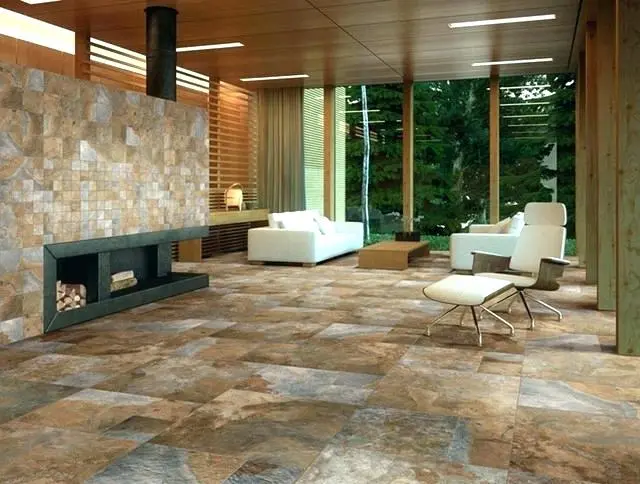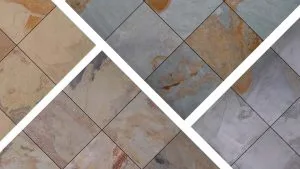Considered as one of the finest grained metamorphic rocks, slate is a widely used construction material worldwide. Primarily used on floors and roofs, this stone is found to be fire-resistant and an excellent electric insulator. From its formation, composition to application, get to know everything about slate tiles in this post.

For ages, slate stone has been considered synonymous with an aesthetical practice, beauty, luxury, and elegance on the choice of roofing material – Slate Tiles. A roof made up of slate features a long and storied record by enabling the longest enduring roofing materials.
History
As per unidentified sources, the application of slate tiles as a roofing material initially started around 1300 A.D in North Wales, England. However, the use of slate stone became mainstream in the 1800s after the advancement in the stone quarrying process which resulted in the proper supply of materials at reasonable prices.
How slate is formed?
Slate comes into shape through the local metamorphosis of mudstone or shale under the influence of low pressure. When shale or mudstone gets exposed to intense pressure and temperature emerging from a tectonic plate action, its clay mineral apparatuses metamorphose and turn into mica minerals like biotite, muscovite, and chlorite that become the major constituents of slate. One distinctive property of slate is that it is created through the foliation process, which denotes the recurrent glaze of metamorphic rocks caused by clipping navies or distinction pressure. Coatings of rocks then take shape vertically to the course of the pressure of metamorphic firmness. This offers slate its aptitude to slash along even planes. This is why it is known as the supreme grained foliated metamorphic rock, with 0.01 mm or lesser space taking place between each coat.
Physical Properties of Slate Stone
- Modulus: Rupture 450 to 850 Kg/cm2
- Specific Gravity: 2.65 to 2.80
- Corrodibility: 0.4 to 0.7%
- Porosity: Extremely low
- Hardness: 2.5 to 4.0 on Moh’s scale
- Compressive Strength: 170 to 240 Kg/cm2
- Weather Impact: Resistant
- Water Absorption: 1.0 to 1.5%
Reasons Why Slate Stone Is Ideal For Roofing and Flooring
Apart from being a natural stone, slate is known to have a number of pluses that make it ideal for roofing and flooring applications. Some of them are given below:
- Naturally elegant and integrally sturdy
For those who look for natural consistency, forte, and durability, the charcoal shade & corrugated texture of the slate stone comes out as a much better choice for roofing applications in modern homes, commercial offices, and public places.
- Diverse color choices
 Another remarkable thing about slate stone is that it comes in a wide range of colors like brown, black, green, pink, red, gold, multicolor, and others. So, no matter what type of construction project you are working on, it is no big deal to find the right stone color to complement other elements of the same.
Another remarkable thing about slate stone is that it comes in a wide range of colors like brown, black, green, pink, red, gold, multicolor, and others. So, no matter what type of construction project you are working on, it is no big deal to find the right stone color to complement other elements of the same.
3. Slate has a distinctive formation
Slatestone is extracted from the natural weathering rocks. In the course of metamorphism, its major constituents such as volcanic ash and clay gain a usual feature known as “Fissility” through the Slaty Cleavage foliation procedure.
The foliation happens in procedures vertical to the course of metamorphic density. Thus, this is what leads to even flat sheets of slate tiles.
- A durable choice
 Natural slate stones tend to have an unmatched lifetime in comparison to other roofing elements. According to a report published by British construction industry, the life of slate stones can be over a century and sometimes even up to two centuries. Obviously, the skilled construction contractor, reliable slate supplier (like Regatta Universal Exports), and precise installation procedure are major decisive factors that ensure the durability of slate stones on diverse roofing applications.
Natural slate stones tend to have an unmatched lifetime in comparison to other roofing elements. According to a report published by British construction industry, the life of slate stones can be over a century and sometimes even up to two centuries. Obviously, the skilled construction contractor, reliable slate supplier (like Regatta Universal Exports), and precise installation procedure are major decisive factors that ensure the durability of slate stones on diverse roofing applications.
The influx of newer and advanced technologies in the natural stone sector has made slate stones quite a reasonable option for folks who work on the all levels of the economy and scales of construction projects.
- Excellent weather resistance
Slate is found to be nearly non-porous, inorganic, and exhibits superb resistance to the growth of molds, weeds, and mildews. Temperature edge, strong wind power, and incessant rains barely cause any sign of wear & tear on the stone.
- Resistance to stains
High-quality slate tiles possess anti-staining characteristics because of their low porosity and mechanical stuff. The presence of minerals in slate stones mainly emerges from volcanic ash, which makes them anti-acidic by nature and resistant to various elements that usually cause stains. Likewise, homeowners can live worry-free about any liquid spillage over their kitchen floor due to its low water absorption rate.
Undoubtedly, one needs to use water-based sealing chemicals that can infiltrate below the surface and in the figure of slate stones. In addition, surfactant sealers are found to safeguard the stone surface by acting as a thin protective coating.
- Inherent feature to amplify the property value
 It is widely known that slate tiles are a bit costly than their counterparts like Asphalt Roof Shingles and other conventional and modern materials. However, when it comes to determining its durability and enduring properties, slate overcomes others in a remarkable fashion. Thus, slate tends to have high real estate value when used on floors, roofs, floors, and other architectural applications along with neighboring landscapes.
It is widely known that slate tiles are a bit costly than their counterparts like Asphalt Roof Shingles and other conventional and modern materials. However, when it comes to determining its durability and enduring properties, slate overcomes others in a remarkable fashion. Thus, slate tends to have high real estate value when used on floors, roofs, floors, and other architectural applications along with neighboring landscapes.
- Low maintenance
In case of extreme impacts, natural fragmentation, cracking, flaking, breaking takes, slate stones in places like roofs, floors, and walls can easily be detached and replaced with newer ones. This means that they are low on maintenance expenses.
Conclusion
In today’s era of modern construction and architecture, slate stone tiles are widely preferred among construction contractors, architects, builders, and homeowners. Their excellent performance against all adverse elements makes them an excellent choice for a sturdy and stable architecture. Put in outdoors and indoors, this natural stone’s superb water resistance property lends an unmatched value to the property across various aspects.
